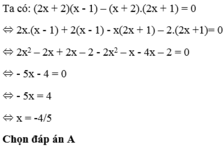Tìm x biết: ( 2 x + 2 ) ( x - 1 ) – ( x + 2 ) . ( 2 x + 1 ) = 0
A. - 4 5
B. - 1 5
C. 4 5
D. 1 5
Hãy nhập câu hỏi của bạn vào đây, nếu là tài khoản VIP, bạn sẽ được ưu tiên trả lời.



............................. Đấng Ed bảo ko chắc cho lắm nên sai thì sr nhé -,-
\(a)\)\(\left|x-1\right|+\left|x-2\right|+...+\left|x-8\right|=22\)
+) Với \(x\ge8\) ta có :
\(x-1+x-2+...+x-8=22\)
\(\Leftrightarrow\)\(8x-36=22\)
\(\Leftrightarrow\)\(x=\frac{29}{4}\)( không thỏa mãn )
+) Với \(x< 1\) ta có :
\(1-x+2-x+...+8-x=22\)
\(\Leftrightarrow\)\(36-8x=22\)
\(\Leftrightarrow\)\(x=\frac{7}{4}\) ( không thỏa mãn )
Vậy không có x thỏa mãn đề bài
\(b)\)\(\left|x-1\right|+\left|x-2\right|+\left|x-3\right|+...+\left|x-100\right|=2500\)
+) Với \(x\ge100\) ta có :
\(x-1+x-2+x-3+...+x-100=2500\)
\(\Leftrightarrow\)\(100x-5050=2500\)
\(\Leftrightarrow\)\(x=\frac{151}{2}\) ( không thỏa mãn )
+) Với \(x< 1\) ta có :
\(1-x+2-x+3-x+...+100-x=2500\)
\(\Leftrightarrow\)\(5050-100x=2500\)
\(\Leftrightarrow\)\(x=\frac{51}{2}\) ( không thỏa mãn )
Vậy không có x thỏa mãn đề bài
Bài 2 :
+) Với \(x\ge-1\) ta có :
\(x+1+x+2+...+x+100=605x\)
\(\Leftrightarrow\)\(100x+5050=605x\)
\(\Leftrightarrow\)\(x=10\) ( thỏa mãn )
+) Với \(x< -100\) ta có :
\(-x-1-x-2-...-x-100=605x\)
\(\Leftrightarrow\)\(-100x-5050=605x\)
\(\Leftrightarrow\)\(x=\frac{-1010}{141}\) ( không thỏa mãn )
Vậy \(x=10\)
~ Đấng phắn ~

a: ĐKXĐ: x<>0; x<>1
\(P=\dfrac{x\left(x+1\right)}{\left(x-1\right)^2}:\dfrac{x^2-1+x+2-x^2}{x\left(x-1\right)}\)
\(=\dfrac{x\left(x+1\right)}{\left(x-1\right)^2}\cdot\dfrac{x\left(x-1\right)}{x+1}=\dfrac{x^2}{x-1}\)
b: |2x+1|=3
=>x=1(loại); x=-2(nhận)
Khi x=-2 thì P=4/-3=-4/3
c: P=-1/2
=>x^2/x-1=-1/2
=>2x^2=-x+1
=>2x^2+x-1=0
=>2x^2+2x-x-1=0
=>(x+1)(2x-1)=0
=>x=1/2; x=-1

\(3\left(x-2\right)+4\left(x-1\right)=25\)
\(\Leftrightarrow3x-6+4x-4=25\)
\(\Leftrightarrow7x=35\)
\(\Leftrightarrow x=5\)
\(\left(5x-3\right)\left(x-2\right)=\left(x-1\right)\left(x-2\right)\)
\(\Leftrightarrow\left(5x-3\right)\left(x-2\right)-\left(x-1\right)\left(x-2\right)=0\)
\(\Leftrightarrow\left(x-2\right)\left(5x-3-x+1\right)=0\)
\(\Leftrightarrow\left(x-2\right)\left(4x+2\right)=0\)
\(\Leftrightarrow\left[{}\begin{matrix}x-2=0\\4x+2=0\end{matrix}\right.\)
\(\Leftrightarrow\left[{}\begin{matrix}x=2\\x=\dfrac{-1}{2}\end{matrix}\right.\)

\(a,\Leftrightarrow\left(x+2\right)\left(x+2-x+3\right)=0\\ \Leftrightarrow5\left(x+2\right)=0\Leftrightarrow x=-2\\ b,\Leftrightarrow2x\left(x-1\right)^2=0\Leftrightarrow\left[{}\begin{matrix}x=0\\x=1\end{matrix}\right.\\ c,\Leftrightarrow\left(x-1-2x-1\right)\left(x-1+2x+1\right)=0\\ \Leftrightarrow3x\left(-x-2\right)=0\Leftrightarrow-3x\left(x+2\right)=0\\ \Leftrightarrow\left[{}\begin{matrix}x=0\\x=-2\end{matrix}\right.\)

\(\frac{1-x}{x^2+x+1}-\frac{x-1}{x^2-x+1}=\frac{3}{\left[x\left(x^4+x^2+1\right)\right]}\)
\(\Leftrightarrow\frac{\left(1-x\right)x\left(x^2-x+1\right)\left(x^4+x^2+1\right)}{x\left(x^2+x+1\right)\left(x^2-x+1\right)\left(x^4+x^2+1\right)}\)\(-\)\(\frac{x\left(x-1\right)\left(x^2+x+1\right)\left(x^4+x^2+1\right)}{x\left(x^2+x+1\right)\left(x^2-x+1\right)\left(x^4+x^2+1\right)}\)\(=\)\(\frac{3\left(x^2-x+1\right)\left(x^2+x+1\right)}{x\left(x^2+x+1\right)\left(x^2-x+1\right)\left(x^4+x^2+1\right)}\)
\(\Rightarrow\left(1-x\right)x\left(x^2-x+1\right)\left(x^4+x^2+1\right)-x\left(x-1\right)\left(x^2+x+1\right)\left(x^4+x^2+1\right)=\)\(3\left(x^2-x+1\right)\left(x^2+x+1\right)\)
\(\Leftrightarrow\left(x-x^2\right)\left(x^2-x+1\right)\left(x^4+x^2+1\right)-\left(x^2-x\right)\left(x^2+x+1\right)\left(x^4+x^2+1\right)=\)\(\left(3x^2-3x+3\right)\left(x^2+x+1\right)\)
\(\Leftrightarrow\left(x^3-x^2+x-x^4+x^3-x^2\right)\left(x^4+x^2+1\right)-\left(x^4+x^3+x^2-x^3-x^2-x\right)\left(x^4+x^2+1\right)=\) \(3x^4+3x^3+3x^2-3x^3-3x^2-3x+3x^2+3x+3\)
\(\Leftrightarrow\left(2x^3-2x^2+x-x^4\right)\left(x^4+x^2+1\right)-\left(x^4-x\right)\left(x^4+x+1\right)=3x^4+3x^2+3\)
\(\Leftrightarrow\left(x^4+x^2+1\right)\left(2x^3-2x^2+x-x^4-x^4+x\right)=3x^4+3x^2+3\)
\(\Leftrightarrow\left(x^4+x^2+1\right)\left(2x^3-2x^2+2x-2x^4\right)=3x^4+3x^2+3\)
\(\Leftrightarrow2x^7-2x^6+2x^5-2x^8+2x^5-2x^4+2x^3-2x+2x^3-2x^2+2x-2x^4-3x^4-3x^2-3=0\)
\(\Leftrightarrow2x^7-2x^6+4x^5-2x^8-7x^4+x^2-3=0\)
Đến đây thì chịu òi :^ Sr nha
\(\frac{1-x}{x^2+x+1}-\frac{x-1}{x^2-x+1}=\frac{3}{x\left(x^4+x^2+1\right)}\)
Ta có \(x^4+x^2+1=\left(x^2+1\right)^2-x^2=\left(x^2-x+1\right)\left(x^2+x+1\right)\)
=> \(\left(1-x\right)\left(\frac{1}{x^2+x+1}+\frac{1}{x^2-x+1}\right)=\frac{3}{x\left(x^4+x^2+1\right)}\)
<=>\(\left(1-x\right)\left(2x^2+2\right).x=3\)
Do \(2x^2+2>0\)
=> \(\left(1-x\right).x>0\)
=> \(0< x< 1\)=> \(2x^2+2< 4\)
Pt<=> \(\left(x-x^2\right)\left(2x^2+2\right)=3\)
Mà \(x-x^2\le\frac{1}{4};2x^2+2< 4\)
=> \(VT< 1\)
=> PT vô nghiệm

(2x+1)(y-3)=12
Vì x;y là số tự nhiên => 2x+1;y-3 là số tự nhiên
=> 2x+1;y-3 E Ư(12)
Ta có bảng:
| 2x+1 | 1 | 12 | 3 | 4 | 2 | 6 |
| y-3 | 12 | 1 | 4 | 3 | 6 | 2 |
| x | 0 | 11/2 (loại) | 1 | 3/2(loại) | 1/2(loại) | 5/2(loại) |
| y | 15 | 4 | 7 | 6 | 9 | 5 |
Vậy cặp số tự nhiên (x;y) cần tìm là: (0;15) ; (1;7)
(2x + 1)(y - 3) = 12
=> 2x + 1;y - 3 thuộc Ư(12)
vì x là stn => 2x + 1 là stn, ta có bảng
| 2x+1 | 1 | 12 | 2 | 6 | 3 | 4 |
| y-3 | 12 | 1 | 6 | 2 | 4 | 3 |
| x | 0 | loại | loại | loại | 1 | loại |
| y | 15 | 7 |

a: \(E=\dfrac{x\left(x+1\right)}{\left(x-1\right)^2}:\left(\dfrac{x+1}{x}+\dfrac{1}{x-1}+\dfrac{2-x^2}{x\left(x-1\right)}\right)\)
\(=\dfrac{x\left(x+1\right)}{\left(x-1\right)^2}:\dfrac{x^2-1+x+2-x^2}{x\left(x-1\right)}\)
\(=\dfrac{x\left(x+1\right)}{\left(x-1\right)^2}\cdot\dfrac{x\left(x-1\right)}{x+1}=\dfrac{x^2}{x-1}\)
b: |x-3|=2
=>x-3=2 hoặc x-3=-2
=>x=5(nhận) hoặc x=1(loại)
Khi x=5 thì \(E=\dfrac{5^2}{5-1}=\dfrac{25}{4}\)
c: Để E=1/2 thì \(\dfrac{x^2}{x-1}=\dfrac{1}{2}\)
\(\Leftrightarrow2x^2-x+1=0\)
hay \(x\in\varnothing\)
f) \(A=\dfrac{x^2}{x-1}=\dfrac{x^2-x+x-1+1}{x-1}=\dfrac{x\left(x-1\right)+x-1+1}{x-1}=x+1+\dfrac{1}{x-1}=x-1+\dfrac{1}{x-1}+2\ge2\sqrt{\left(x-1\right).\dfrac{1}{x-1}}+2=4\)\(A=4\Leftrightarrow x=2\)
-Vậy \(A_{min}=4\)

\(C=\left(\dfrac{2x^2+1}{x^3-1}-\dfrac{1}{x-1}\right)\div\left(1-\dfrac{x^2-2}{x^2+x+1}\right)\)
ĐKXĐ: \(x\ne1\)
\(C=[\left(\dfrac{2x^2+1}{(x-1)\left(x^2+x+1\right)}-\dfrac{1}{x-1}\right)]\div\left(1-\dfrac{x^2-2}{x^2+x+1}\right)\)
\(\Leftrightarrow C=[\left(\dfrac{2x^2+1}{(x-1)\left(x^2+x+1\right)}-\dfrac{1\left(x^2+x+1\right)}{(x-1)\left(x^2+x+1\right)}\right)]\div[\dfrac{(x-1)\left(x^2+x+1\right)}{(x-1)\left(x^2+x+1\right)}-\dfrac{(x^2-2)(x-1)}{(x^2+x+1)\left(x-1\right)}]\)
\(\Rightarrow C=\left[2x^2+1-1\left(x^2+x+1\right)\right]\div\left[\left(x-1\right)\left(x^2+x+1\right)-\left(x-1\right)\left(x^2-2\right)\right]\)
\(\Rightarrow C=(2x^2+1-x^2-x-1)\div\left[\left(x-1\right)\left(x^2+x+1-x^2+2\right)\right]\)
\(\Rightarrow C=\left(x^2-x\right)\div\left[\left(x-1\right)\left(x+3\right)\right]\)

b: Ta có: \(\left(x-2\right)^3-x^2\left(x-6\right)=4\)
\(\Leftrightarrow x^3-6x^2+12x-8-x^3+6x^2=4\)
\(\Leftrightarrow12x=12\)
hay x=2
d: Ta có: \(3\left(x-1\right)^2-3x\left(x-5\right)=1\)
\(\Leftrightarrow3x^2-6x+3-3x^2+15x=1\)
\(\Leftrightarrow9x=-2\)
hay \(x=-\dfrac{2}{9}\)